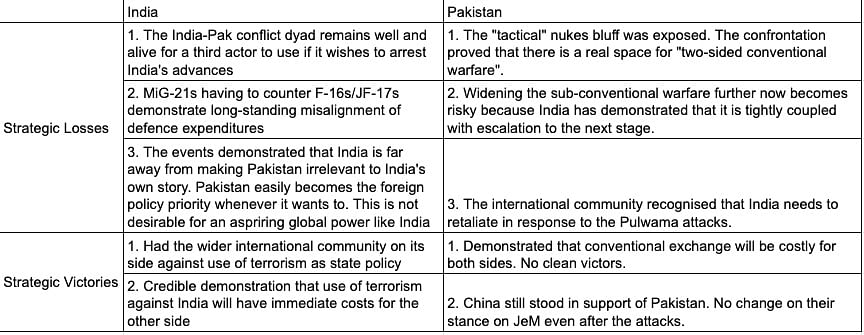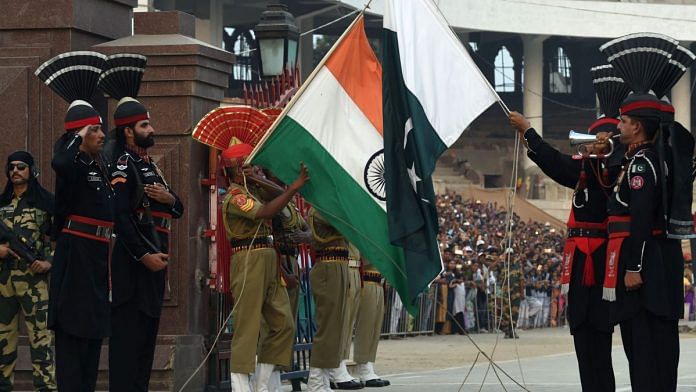As the fog of war between India and Pakistan clears, here’s an assessment of the strategic consequences that go beyond immediate tactical gains and losses.
For Pakistan
First and foremost, engaging in terrorism has now become costly. In the past, the Pakistani military did not face direct and overt repercussions for actions of terrorist outfits operating from its soil. With the 2016 surgical strikes and the 2019 air strikes, India has demonstrated that any provocation in the sub-conventional domain will directly hurt the Pakistani army’s image as the ultimate defenders of the ideological and territorial frontiers of Pakistan. This is a massive strategic loss for the Pakistani military-jihadi complex.
Two, Pakistan’s bluff that any Indian military action on Pakistani territory would be met with battlefield nukes fell flat. Pakistan has repeatedly claimed that there is no scope for a conventional battle — any Indian military action on Pakistani soil will get thwarted by use of miniaturised nuclear weapons. But recent events prove how this threat is not credible. A conflict involving conventional forces on both sides is still possible and this should worry Pakistani strategists in the years ahead.
Also read: History has lessons for a BJP banking on Pulwama and Balakot to win Lok Sabha elections
Another strategic loss for Pakistan was the reaction of the international community. In the past, the international community wavered and equated India with Pakistan even if only the latter was using terrorism as a tool of state policy. That has changed over the last few years partly because of the West’s own experience with terrorism. As a result, there was a wider recognition that India reserved the right to retaliate in response to the Pulwama attacks. The delay in the international response in de-escalating the situation illustrates that Pakistan cannot rely on other nation-states to restrain India’s response to terrorist strikes.
Having said this, Pakistan made strategic gains on two counts. First it demonstrated that an exchange of force at the conventional level will be costly for both sides. There will be no clean victors and Pakistan will not go down without having hurt India substantially. Second, China remained steadfast in its support for Pakistan during the entire episode. There was no perceptible change in China’s stated position even on matters that are marginal to China’s own strategic goals. For example, China did not budge even on the issue of a UNSC ban on Masood Azhar.
A handy guide to the ‘gains and losses’ on both sides:

For India
Pakistan’s strategic losses are not necessarily India’s gains because both of them are playing different games. India’s game is to bring prosperity to all its citizens while demonisation of India still remains central to the Pakistani military-jihadi complex’s narrative. With this difference in mind, India did lose out on three counts in its own game.
One, the events demonstrated that the India-Pakistan conflict still remains a knob that can be turned on and off by a third actor at will. Despite the widening economic differences, Pakistan remains a valuable reserve option for nation-states that aim to arrest India’s role on the global stage.
Two, a related strategic loss is that a flare-up with Pakistan has the potential to place India’s other and more important foreign policy objectives on the backburner. Since the border stand-off at Doklam in 2017, managing India’s relationship with China was being internalised as the most important foreign policy question. The focus was shifting towards enhancing Indian capabilities to match the bigger adversary. But Pakistan is now back in focus and we risk dropping the ball on other issues that are far more important to India and Indians.
Also read: India and Pakistan are both losing the forever war
Three, the air power deployment should sound alarm bells in India. Pakistan’s deployment of JF-17s and F-16s had to be countered by vintage MiG-21 aircraft. Despite India’s pilots rising to the occasion, how did we end up in this situation in the first place? This is a clarion call for India to review its economics of defence and shift its force posture from manpower to firepower.
India gained strategically in two ways. One, India has now proved beyond doubt that it has a range of possible options involving the use of force against those who use terrorism as a state policy. This should instil confidence in Indians that India’s choice of restraint is not for the want of retaliatory options but after weighing the strategic consequences involved.
The changing global narrative against the use of terrorism as a state policy is also to India’s advantage. India’s actions will bring urgency to anti-terrorism collaboration outside the realm of using force such as the Financial Action Task Force (FATF).
Recent events have shaken up the Pakistani military-jihadi complex. India, on the other hand, is still far away from its strategic aim — accumulating enough power across all dimensions to ensure that Pakistan becomes merely a distraction, not a foreign policy priority.
The author is head of research, The Takshashila Institution.




Pakistan with all its fault at this juncture it seems is being used for Indian internal politics.Plus the air war seemed less between IAF & PAF and more between Russian manufacturers, French & U.S suppliers who are vying for $ 20 billion Indian market.
This was like a near miss air accident, if that does not sound unduly alarmist. Did Pakistan really need to send 24 aircraft in a shallow penetration of the LoC to tell us that they have the will, power and ability to respond to a strike like Balakot. For that matter, was it really a shock or a revelation to them that Mirage 2000s could perform the task that they did. 2. If India and Pakistan were talking to each other in a more structured way, these are some of the things they could discuss. Where the red lines are, what the response will be. To that extent, PM Imran Khan sounding a note of caution on “ miscalculations “. Is right. There should be safer ways for both countries to understand the point beyond which an action will lead to a dangerous reaction.